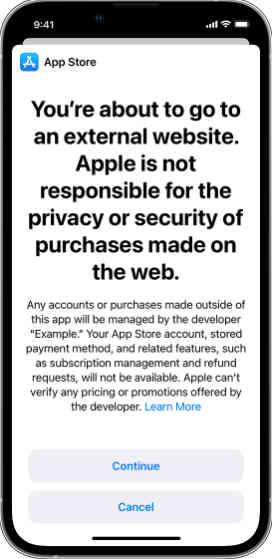| Apple Wins Either Way |
| Written by Mike James | |||
| Wednesday, 24 January 2024 | |||
|
The US Supreme Court has declined to hear the appeal by Apple over the decision that it should open up the App Store to other methods of payment. It really doesn't matter because Apple has found a way to comply with the verdict and still come out on top. By contrast with the recent win against Google, Epic Games seems to be making little progress with getting Apple to free up its walled garden of an App Store. The original trial, the Apple version of the Google one, took place in May 2021 and the verdict was mostly that Apple was OK to run the App Store as it was doing so. Nine of the ten counts were rejected and the only one that went in Epic's favor was the way Apple restricted payment methods. The court ordered that Apple make it possible to link to other websites taking payment. Not content with nine out of ten, Apple asked the Supreme Court to consider this decision and some commentators were of the opinion that it might not go all Apple's way, especially after the Google verdict. However, the game is postponed as the Supreme Court has refused to consider the issue, which means the original verdict stands and Apple has to weaken its grip on programmers - or does it? Soon after the decision not to reopen the verdict, Apple updated its guidelines and it seems a great example of winning either way. This relaxation is to the letter of the verdict, but not its spirit. In particular, Apple is still taking a percentage of any sale made within seven days of a click on an app link to an external web page. This is a 3% reduction on its standard rate, but this still severely limits any price cutting that is possible. As Tim Sweeney, CEO of Epic writes: "Apple has introduced an anticompetitive new 27% tax on web purchases. Apple has never done this before, and it kills price competition. Developers can't offer digital items more cheaply on the web after paying a third-party payment processor 3-6% and paying this new 27% Apple Tax." Add to this the fact that Apple controls where the external links may be shown and things look even worse. They cannot be on the same page as the usual purchase option. They have to be somewhere else, which means that they cannot be shown when the user is trying to make a purchase. Apple will also place a "scare screen" (Tim Sweeny's term) warning of possible privacy or security risks in moving to an external web page.
To make things worse, the transfer to the external site is not smooth, i.e. the user has to log in again and find the item to buy. Clever isn't it? It seems that Apple has found a way to win whichever way the Supreme Court rules, including not deciding at all. Tim Sweeny calls it "bad faith" saying: "Epic will contest Apple's bad-faith compliance plan in District Court." More InformationDistributing apps in the U.S. that provide an external purchase link Related ArticlesApple Appeals To Supreme Court In Epic Case Apple Wins Appeal Against Epic Epic v Apple - Both Sides Lose But It's A Win For Developers Epic Games V Apple & Google - Smash The App Stores Epic Games Takes On Apple - Unintended Consequences Epic Games CEO Finally Notices That UWP Apps Are A Walled Garden To be informed about new articles on I Programmer, sign up for our weekly newsletter, subscribe to the RSS feed and follow us on Twitter, Facebook or Linkedin.
Comments
or email your comment to: comments@i-programmer.info |
|||
| Last Updated ( Wednesday, 24 January 2024 ) |




